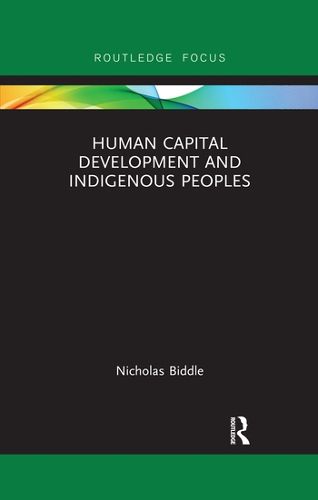Readings Newsletter
Become a Readings Member to make your shopping experience even easier.
Sign in or sign up for free!
You’re not far away from qualifying for FREE standard shipping within Australia
You’ve qualified for FREE standard shipping within Australia
The cart is loading…






In all countries for which data is available, Indigenous peoples have lower rates of formal educational participation and attainment than their non-Indigenous counterparts. There are many structural reasons for this, but it may in part be related to the perceived relationship between the costs and benefits of education. Human Capital Development and Indigenous Peoples systematically applies a human capital approach to educational policy, to help understand the education and broader development outcomes of indigenous peoples.
The basic Human Capital Model states that individuals, families and communities will invest in education until the benefits of doing so no longer outweigh the costs. This trade-off is often considered in monetary terms. Here the author broadens cost-benefit definitions to include health and wellbeing improvements alongside social costs driven by discrimination and unfair treatment in schools. With coverage of the Americas, Asia, Australia and New Zealand, the book critiques existing approaches, and provides an outlet for the self-described experiences of a diverse set of indigenous peoples on the breadth of educational costs and benefits. Combining new quantitative analysis, cross-national perspectives and an explicit policy focus, this book provides policy actors with a detailed understanding of the education decision and equips them with the knowledge to enhance benefits while minimising costs.
This book will appeal to policy-engaged researchers in the fields of economics, demography, sociology, political science, development studies and anthropology, as well as policy makers or practitioners who are interested in incorporating the most recent evidence into their practice or frameworks.
$9.00 standard shipping within Australia
FREE standard shipping within Australia for orders over $100.00
Express & International shipping calculated at checkout
In all countries for which data is available, Indigenous peoples have lower rates of formal educational participation and attainment than their non-Indigenous counterparts. There are many structural reasons for this, but it may in part be related to the perceived relationship between the costs and benefits of education. Human Capital Development and Indigenous Peoples systematically applies a human capital approach to educational policy, to help understand the education and broader development outcomes of indigenous peoples.
The basic Human Capital Model states that individuals, families and communities will invest in education until the benefits of doing so no longer outweigh the costs. This trade-off is often considered in monetary terms. Here the author broadens cost-benefit definitions to include health and wellbeing improvements alongside social costs driven by discrimination and unfair treatment in schools. With coverage of the Americas, Asia, Australia and New Zealand, the book critiques existing approaches, and provides an outlet for the self-described experiences of a diverse set of indigenous peoples on the breadth of educational costs and benefits. Combining new quantitative analysis, cross-national perspectives and an explicit policy focus, this book provides policy actors with a detailed understanding of the education decision and equips them with the knowledge to enhance benefits while minimising costs.
This book will appeal to policy-engaged researchers in the fields of economics, demography, sociology, political science, development studies and anthropology, as well as policy makers or practitioners who are interested in incorporating the most recent evidence into their practice or frameworks.